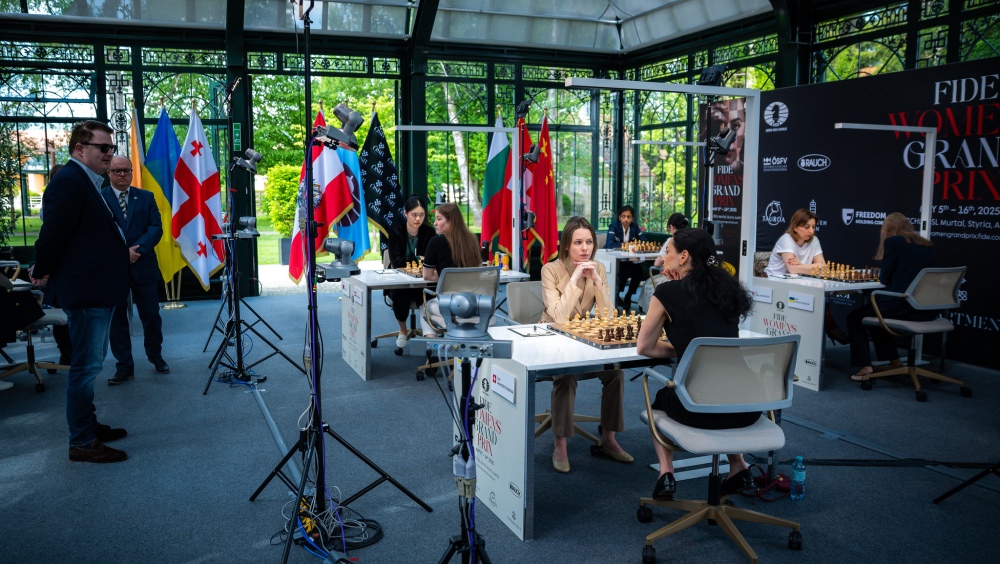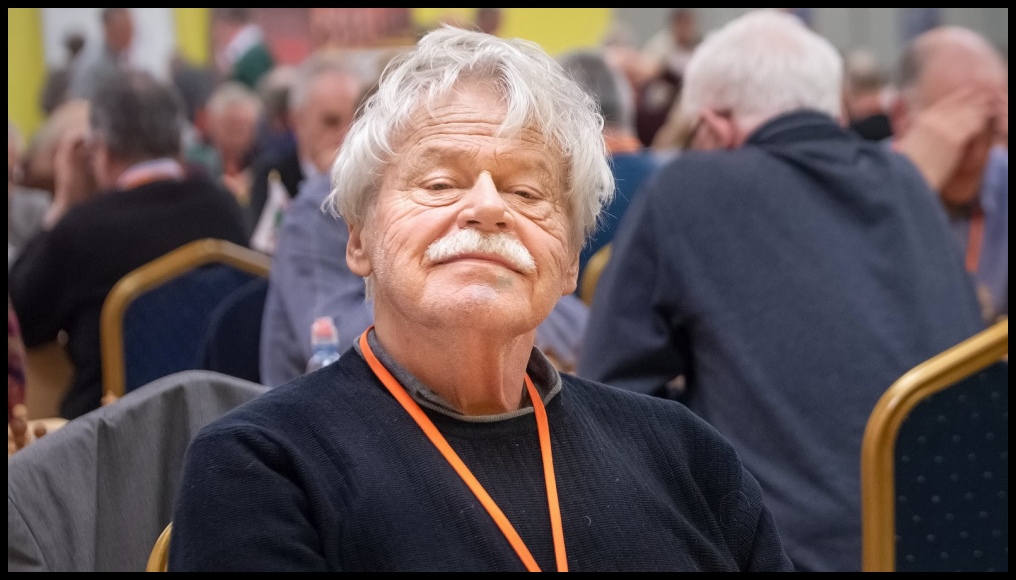WGP Austria R08: Leaders Muzychuk and Zhu held to draws

Anna Muzychuk’s momentum stalled with a fourth consecutive draw, but she remains level at the top after Olga Badelka halted Zhu Jiner’s five-game winning run. The race for first place remains wide open ahead of the final round. Tensions were running high at the orangery on the grounds of Gschlössl Murtal in Styria, as the penultimate round of the 2024/2025 FIDE Women’s Grand Prix series was about to start. Three of the five games ended in draws, while the two decisive encounters were marked by sharp swings and desperate time scrambles. Anna Muzychuk and Zhu Jiner remain tied for first as they head into the final round. Muzychuk will have the white pieces against Vaishali Rameshbabu and must win to have a shot at clinching both the tournament and the overall Women’s Grand Prix title — provided Zhu does not win her game. Zhu, on the other hand, can afford a draw but must avoid defeat with the black pieces against former world champion Alexandra Kosteniuk. The round started with a minute of silence. Earlier in the day, news broke that the long-serving president of the Austrian Chess Federation and member of the Honorary Praesidium of FIDE, Kurt Jungwirth, passed away at the age of 95. The first game to finish – after three hours and 20 minutes of play – was between Lela Javakhishvili and Anna Muzychuk. In the English Opening, White (Lela) was trying to make a breakthrough on the queenside. The Georgian was doing better on the clock, but the game was complicated and without any real chances for either side. A threefold repetition sealed a draw on move 28. Anna didn’t look very pleased as she left the venue. In the first part of the tournament, she had one draw (with her sister Mariya) and three victories. In the second part – four draws. Today’s result puts into question her chances of becoming the outright winner of the final leg of the Women’s Grand Prix, which is what she needs if she wants to win the series and secure a spot in the 2026 Women’s Candidates. The second leader of the tournament also drew. Playing the French Defence, Olga Badelka managed to stop Zhu Jiner’s run of five consecutive victories. The two relatively quickly progressed to an endgame with a pair of rooks and a pair of minor pieces. Although Zhu had an hour on the clock compared to Badelka’s 30 minutes after 25 moves, it was not enough to tip the balance in her favour in an equal position. Seeing that Anna drew, Zhu pressed on and even played a bit riskily, hoping that Badelka – who has not had a great tournament, would stumble. But Olga was confident in holding her ground. When nothing more could have been done, after three and a half hours and 43 moves, Zhu had to admit that it was time to call it a day. In the last round, she will have a tough challenge against the former world champion, Alexandra Kosteniuk. The sharpest and most intense game of the round – and possibly the entire tournament so far – happened between Nana Dzagnidze, who was White, and Nurgyul Salimova. According to the chessgames.com database, this was only the second game between the two. Previously, they met in 2021 during the World Blitz Championship in Almaty (Kazakhstan), from which Salimova emerged as the victor. Dzagnidze started with the English Opening and managed to get a slight advantage. As early as move 11, the game entered a sharp phase. White is better. Still, the most logical choice for Black was to secure her king by castling and for the game to run its course. Instead, Salimova embarked on an adventure which would see a very sharp exchange on board. 11…Nxe4? Taking the pawn but at what cost? After the cold-blooded 12.Qc2 Nxc3 13.Nc7+ Kd8 14.bxc3 Nd4 15.Qd2 Qa4 16.cxd4 Kxc7 and Black keeps a pawn but is severely underdeveloped and exposed. Instead, Dzagnidze made a weak move: 12.a3? and after Qa5 13.Qg4 Nxc3! 14.Qxg7 Nxb5+ 15.b4 Nxb4!! 16.Qxh8+ Ke7 17.bxc4 Qxb4+ 18.Kd1 Qd6+ 19.Kc2 (Ke1 was better) 19…Nd4+ 20.Kc3 Nc6! Black’s risky approach paid off – she got enough compensation and counterplay while White had to be careful because of her exposed king. By this point in the game, both had well under 20 minutes on the clock. By the time they reached the position below, both were in desperate time trouble. Black is in control. The best way to proceed was 32…Na1+ 33.Rxa1 Qb3+ 34.Kd3 c2+ 35.Kd2 cxd1=R+ 36.Rxd1 Qb4+. However, Salimova played 32…Qe4+? and after 33.Bd3 Qa4 it was equal again, as White could deliver a perpetual check with 34.Qg5+ Ke8 35.Qg8…. Instead, Nana played 34.Qxc3?? but Nurgyul immediately returned the favour with 34…Nc5+?? (after 34…Rb6, White has no defence against Black’s multiple threats) 35.Kd2 Qf4+ 36.Ke1 Nxd3 37.Qxd3 Rxb1 38.Rxb1 Ba6!? made with seconds on the clock. 38…Qxh2 recommended by the computer leads to an equal position. After 39.Qa3+ d6 40.Rb4 Qe5+ Both reached the first time control with White now being notably better. Ten moves later, Dzagnidze was completely winning. This was the longest game of the day, finishing after just under five hours of play. Despite being known for her time troubles, Dzagnidze is having a solid performance in the tournament. With just one loss, five draws and two wins – she is now on 4.5 and is in tied fourth place with Vaishali Rameshbabu who also drew today. Two games of round eight ended in a draw. In the Murphy Defence of the Ruy Lopez, Vaishali gained a slight initiative over Tan Zhongyi. However, after 25 moves, Vaishali was down to 28 minutes while Tan had more than an hour. Still, the young Indian GM played steadily, and by move 35 the two transitioned to an even rook endgame. Similarly to her round six win over Salimova, Tan tried to grind her opponent, in another effort to successfully drain blood from stone.
Vlastimil Hort (1944–2025)

Czech-German grandmaster Vlastimil Hort, one of the world’s strongest players during the 1960s and 1970s and a former world number six, has passed away at the age of 81. Vlastimil Hort was born on 12 January 1944 in Kladno, in the Protectorate of Bohemia and Moravia (now the Czech Republic). He learned chess at the age of five and immediately showed great potential. Hort progressed rapidly, making his debut for the Czechoslovak national team at the age of sixteen. A Grandmaster since 1965, Hort reached his peak in the 1970s. Playing for the “World” team in the famous “USSR vs. Rest of the World” match in 1970, he faced Lev Polugaevsky on board four and defeated him with a score of 2.5–1.5—one of the highlights of his career. In 1976, he finished third in the Manila Interzonal, earning a spot in the Candidates Tournament. His Candidates quarterfinal match against Boris Spassky became one of the most memorable demonstrations of sportsmanship in chess history. During the later stages of the match, Spassky fell ill and had used up all his allotted time-outs. Hort could have claimed victory by default, but instead, he offered Spassky one of his own time-outs, allowing the former World Champion to recover and continue. Spassky eventually won the match by a narrow margin. Photo: Icelandic Chess Federation A five-time Czechoslovak champion (1970, 1971, 1972, 1975, and 1977), Hort moved to West Germany in 1985 and went on to win the national championship of his new homeland in 1987, 1989, and 1991. Vlastimil Hort represented Czechoslovakia and later Germany in a total of 14 Chess Olympiads: for Czechoslovakia in 1960, 1962, 1964, 1966, 1968, 1970, 1972, 1974, 1980, 1982, and 1984, and for Germany in 1988, 1990, and 1992. Following his successful playing career, Hort became a beloved commentator and columnist. He appeared frequently alongside Grandmaster Helmut Pfleger in the popular television program Schach der Großmeister, which developed a broad and loyal following. FIDE extends its sincere condolences to Vlastimil Hort’s family, friends, and loved ones.
FIDE statement on suspending chess in Afghanistan

FIDE and the global chess community deeply regret the decision of the Afghan government to suspend chess over gambling concerns. FIDE is actively consulting the IOC, the Asian Chess Federation and other relevant sports and international bodies to find a constructive solution. We believe that chess is one of the most beautiful sports in the world, promoting hard work, patience, fairness, and openness. Beyond the board, chess is a powerful tool for community building and bringing people together. If there is a game, a sport that depends almost completely on skill and preparation, rather than chance, it is chess. Chess has a long and established presence in Afghanistan. In recent years, the game has thrived in the country, with more young people taking up chess. Suspending chess can harm its development and deny opportunities for future Afghan players to showcase their talent and represent their country on the global stage. FIDE will continue to follow developments closely, engaging in a constructive dialogue with the authorities, working with international sports organisations and other relevant stakeholders, to explore ways to have chess reinstated in Afghanistan as soon as possible.

